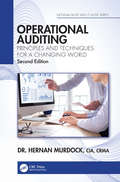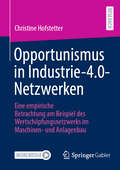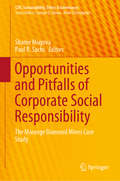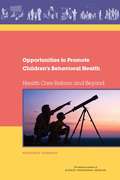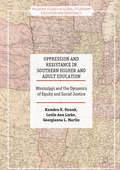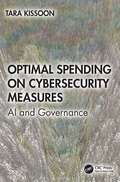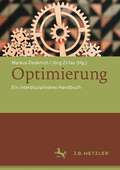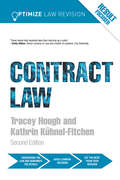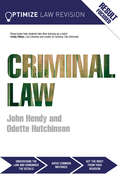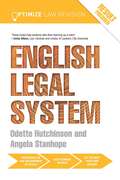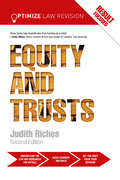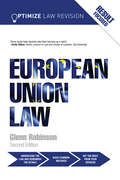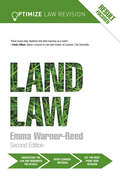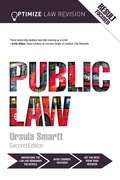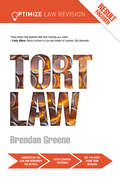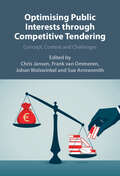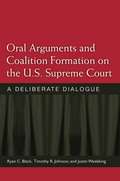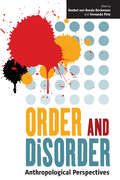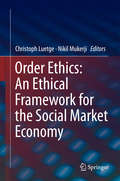- Table View
- List View
Operational Auditing: Principles and Techniques for a Changing World (Internal Audit and IT Audit #11)
by Hernan MurdockOperational Auditing: Principles and Techniques for a Changing World, 2nd edition, explains the proven approaches and essential procedures to perform risk-based operational audits. It shows how to effectively evaluate the relevant dynamics associated with programs and processes, including operational, strategic, technological, financial and compliance objectives and risks. This book merges traditional internal audit concepts and practices with contemporary quality control methodologies, tips, tools and techniques. It explains how internal auditors can perform operational audits that result in meaningful findings and useful recommendations to help organizations meet objectives and improve the perception of internal auditors as high-value contributors, appropriate change agents and trusted advisors. The 2nd edition introduces or expands the previous coverage of: • Control self-assessments. • The 7 Es framework for operational quality. • Linkages to ISO 9000. • Flowcharting techniques and value-stream analysis • Continuous monitoring. • The use of Key Performance Indicators (KPIs) and Key Risk Indicators (KRIs). • Robotic process automation (RPA), artificial intelligence (AI) and machine learning (ML); and • Adds a new chapter that will examine the role of organizational structure and its impact on effective communications, task allocation, coordination, and operational resiliency to more effectively respond to market demands.
Opferorientierung im Strafvollzug: Eine rechtsdogmatische Untersuchung zur Auslegung opferbezogener Vorschriften im deutschen Strafvollzugsrecht
by Katharina Marianne RadkeBereits seit den 1980er Jahren wurde eine Einbeziehung des Straftatopfers und seiner Belange in das deutsche Strafvollzugsrecht diskutiert. Im Strafvollzugsgesetz des Bundes spielte die Opferorientierung gleichwohl eine untergeordnete Rolle. Erst mit den nach der Föderalismusreform von 2006 erlassenen Landesstrafvollzugsgesetzen wurde die Opferorientierung umfangreich in das Strafvollzugsrecht einbezogen. Durch die Berücksichtigung von Opferinteressen bei der Ausgestaltung des Vollzugs der Freiheitsstrafe ergeben sich eine Vielzahl neuer strafvollzugsrechtlicher Fragestellungen. Diese betreffen beispielsweise die Vereinbarkeit von Opferorientierung und Resozialisierung, den Schutz von Opfern vor inhaftierten Täter*innen und die Möglichkeiten von Wiedergutmachung und Tatausgleich während der Inhaftierung. In diesem Buch werden die Hintergründe der Opferorientierung des Strafvollzugsrechts untersucht und so Maßstäbe zur Auslegung der opferorientierten Vorschriften der Landesstrafvollzugsgesetze entwickelt. Bei der Auslegung der opferorientierten Strafvollzugsvorschriften werden alle 16 Landesstrafvollzugsgesetze einbezogen. Dadurch wird versucht, zahlreiche Fragen zu beantworten, die sich durch die Berücksichtigung des Opfers und seiner Interessen innerhalb der Landesstrafvollzugsgesetze stellen.
Opium’s Long Shadow: From Asian Revolt to Global Drug Control
by Steffen RimnerIn 1920 the League of Nations Advisory Committee on the Traffic in Opium and Other Dangerous Drugs captured eight decades of political turmoil over opium trafficking. Steffen Rimner shows how local protests crossed imperial, national, and colonial boundaries to harness naming and shaming in international politics—a deterrent that continues today.
Opportunismus in Industrie-4.0-Netzwerken: Eine empirische Betrachtung am Beispiel des Wertschöpfungsnetzwerks im Maschinen- und Anlagenbau
by Christine HofstetterInnerhalb zwischenbetrieblicher Beziehungen gilt Opportunismus seit jeher als zentrales Problem, das trotz großer Forschungsbemühungen noch viele Fragen aufwirft. Erschwerend kommt hinzu, dass Industrie 4.0 weitreichende Veränderungen in den Wertschöpfungsarchitekturen mit sich bringt. Die Wissenschaft hat die Erforschung von Opportunismus in der sich neu herausbildenden Netzwerkumgebung jedoch vernachlässigt. Das vorliegende Buch untersucht unter Zuhilfenahme relevanter Theorien die den Opportunismus betreffenden Wirkungen ausgewählter Determinanten (strukturelle Einbettung, externe Unsicherheit, Abhängigkeit, distributive Ungerechtigkeit, Einsatz von Verträgen, intrinsische Motivation, gemeinsame Beziehungserfahrung) und ihr Zusammenspiel mit dem Moderator Sozialkapital in einer Industrie-4.0-Netzwerkumgebung. Unter Rückbesinnung auf Theorien aus der Psychologie und Soziologie werden zudem die jeweiligen Opportunismusadressaten identifiziert, welche in der dyadischen Forschung naturgemäß offensichtlich waren. Eine qualitativ-empirische Untersuchung von sechs Wertschöpfungsnetzwerken im Industriegütermarkt stützt nicht nur die getätigten Vorannahmen, sondern bringt auch eine völlig neue Größe ins Spiel: das Ökonomische Kapital.
Opportunities and Pitfalls of Corporate Social Responsibility: The Marange Diamond Mines Case Study (CSR, Sustainability, Ethics & Governance)
by Shame Mugova Paul R. SachsThis book addresses key aspects of corporate social responsibility (CSR) and explores them from a variety of perspectives in a case study on the Marange diamond mines in Zimbabwe. The business case of the Marange mines is presented to demonstrate the challenge of practicing social responsibility while considering and balancing the needs of a developing nation, environmental protection, community involvement and international business. Lessons learned from the case study will help business leaders and strategists in developing countries and multinational corporations to better understand and employ CSR principles so as to enhance sustainability and social impact. Further, the book provides a unique combination of academic, industrial and local approaches.
Opportunities to Promote Children's Behavioral Health: Workshop Summary
by Steve OlsonThe Patient Protection and Affordable Care Act (ACA), which was signed into law in 2010, has several provisions that could greatly improve the behavioral health of children and adolescents in the United States. It requires that many insurance plans cover mental health and substance use disorder services, rehabilitative services to help support people with behavioral health challenges, and preventive services like behavioral assessments for children and depression screening for adults. These and other provisions provide an opportunity to confront the many behavioral health challenges facing youth in America. To explore how the ACA and other aspects of health care reform can support innovations to improve children's behavioral health and sustain those innovations over time, the Forum on Promoting Children's Cognitive, Affective, and Behavioral Health held a workshop on April 1-2, 2015. The workshop explicitly addressed the behavioral health needs of all children, including those with special health needs. It also took a two-generation approach, looking at the programs and services that support not only children but also parents and families. This report summarizes the presentations and discussions of this workshop.
Opposing Perspectives on the Drone Debate
by Bradley Jay StrawserDoes the lethal use of drones pose any new or difficult moral problems? Or is the controversy over these weapons merely a distraction from deeper questions regarding the justice of war and the United States' bellicose foreign policy? Opposing Perspectives on the Drone Debate pulls no punches in answering these questions as five scholars square off in a lively debate over the ethics of drones and their contentious use in a point-counterpoint debate. The contributing authors are some of the foremost thinkers in international affairs today, spanning the disciplines of philosophy, sociology, political science, and law. Topics debated range from the US's contested policy of so-called "targeted killing" in Pakistan's tribal regions to fears over the damaging effects such weaponry has on our democratic institutions to the more abstract moral questions raised by killing via remote control such as the duty to capture over kill.
Oppression and Resistance in Southern Higher and Adult Education
by Kamden K. Strunk Leslie Ann Locke Georgianna L. MartinThis book explores the long history of oppression and resistance in adult and higher education, situated in Mississippi. The state serves as a unique site in which intersecting narratives around race, ethnicity, social class, opportunity, democracy, and equity have played out over the past several decades. In this book, the authors highlight the experiences of students and adults in Mississippi who provide both covert, subtle resistance to the dominant, oppressive educational narrative in the state, as well as those who provide active, visible resistance. Using critical pedagogy and critical theory to drive their analysis, the authors highlight the systematic and continuous nature of oppression, and theorize ways forward toward liberation in Mississippi, the South, and the nation.
Optimal Spending on Cybersecurity Measures: AI and Governance
by Tara KissoonThe aim of this book is to demonstrate the use of business‑driven risk assessments to address government regulations and guidelines specific to AI risks, as AI systems often require access to personal data. All aspects of AI, machine learning models, continuous learning, generalization, and predictive and descriptive analytics are dependent on massive datasets. The more diverse and comprehensive the data, the better an AI can perform. Therefore, AI systems require vast amounts of personal data, and should this data be accessed by unauthorized individuals or organizations, it will lead to a privacy breach, which may result in personal harm to citizens, i.e., identity theft.This book introduces the cyber risk investment model and the cybersecurity risk management framework used within business‑driven risk assessments to address government regulations, industry standards, and applicable laws. It can be used by various stakeholders who are involved in the implementation of cybersecurity measures to safeguard sensitive data. This framework facilitates an organization’s risk management decision‑making process to demonstrate the mechanisms in place to fund cybersecurity measures and demonstrates the application of the process by showcasing two case studies.Features: Aims to strengthen the reader’s understanding of industry governance, AI risk, and compliance practices. Incorporates an innovative approach to assess business risk management specific to AI systems. Explores the strategic decisions made by organizations when implementing cybersecurity measures and leverages an integrated approach to include risk management elements.
Optimierung: Ein interdisziplinäres Handbuch
by Jörg Zirfas Markus DederichDieses interdisziplinäre Handbuch rekonstruiert Optimierung als ein Phänomen, das konstitutiv in aktuelle Entwicklungen der Gegenwart eingeschrieben ist. Denn es erscheint kaum mehr möglich, nicht optimieren zu wollen oder zu können. Das gilt für die Arbeit an sich selbst, die Verbesserung des Anderen und die Perfektionierung der Welt. Optimierung verspricht messbare Steigerungen von Effektivität und Effizienz sowie eine Erweiterung der Reichweite von Einfluss und Macht. Sie wirft aber auch Fragen der Instrumentalisierung, der Verdinglichung und Entfremdung sowie Fragen nach Grenzen und Unverbesserlichkeiten auf. Ohne eine Auseinandersetzung mit der Idee der Optimierung lässt sich eine moderne Humanwissenschaft heute nicht mehr konzipieren.
Optimize Contract Law (Optimize)
by Tracey Hough Kathrin Kuhnel-FitchenThe Optimize series is designed to show you how to apply your knowledge in assessment. These concise revision guides cover the most commonly taught topics, and provide you with the tools to: Understand the law and remember the details using diagrams and tables throughout to demonstrate how the law fits together Contextualise your knowledge identifying and explaining how to apply legal principles for important cases providing cross-references and further reading to help you aim higher in essays and exams Avoid common misunderstandings and errors identifying common pitfalls students encounter in class and in assessment Reflect critically on the law identifying contentious areas that are up for debate and on which you will need to form an opinion Apply what you have learned in assessment presenting learning objectives that reflect typical assessment criteria providing sample essay and exam questions, supported by end-of chapter feedback The series is also supported by comprehensive online resources that allow you to track your progress during the run-up to exams. This second edition has been fully amended to reflect the latest cases and developments in the Law, as well as new and improved diagrams throughout
Optimize Criminal Law (Optimize)
by John Hendy Odette HutchinsonThe Optimize series is designed to show you how to apply your knowledge in assessment. These concise revision guides cover the most commonly taught topics, and provide you with the tools to: Understand the law and remember the details · using diagrams and tables throughout to demonstrate how the law fits together Contextualise your knowledge · identifying and explaining how to apply legal principles for important cases · providing revision advise to help you aim higher in essays and exams Avoid common misunderstandings and errors · identifying common pitfalls students encounter in class and in assessment Reflect critically on the law · identifying contentious areas that are up for debate and on which you will need to form an opinion Apply what you have learned in assessment · presenting learning objectives that reflect typical assessment criteria · providing sample essay and exam questions, supported by end-of-chapter feedback The series is also supported by comprehensive online resources that allow you to track your progress during the run-up to exams. www.routledge.com/cw/optimizelawrevision
Optimize English Legal System: Optimize English Legal System (Optimize)
by Odette Hutchinson Angela Stanhope‘[Optimize is] ideal for undergraduate students at all levels. The content is of a high standard, easy to read and understand. The materials are very catching and easy on the eye making it easy to read and digest the materials…an essential study tool for all law students' - George Ellison, Derby ‘I am really impressed…the strengths are the user friendly format, clear explanations, helpful diagrams/flowcharts and appropriate suggestions for analysing the issues concerned’ - Katherine Davies, Northumbria The Optimize series is designed to show you how to apply your knowledge in assessment. These concise revision guides cover the most commonly taught topics, and provide you with the tools to: Understand the law and remember the details o using diagrams and tables throughout to demonstrate how the law fits together Contextualise your knowledge o identifying and explaining how to apply legal principles for important cases o providing revision advice to help you aim higher in essays and exams Avoid common misunderstandings and errors o identifying common pitfalls students encounter in class and in assessment Reflect critically on the law o identifying contentious areas that are up for debate and on which you will need to form an opinion Apply what you have learned in assessment o presenting learning objectives that reflect typical assessment criteria o providing sample essay and exam questions, supported by end-of chapter feedback The series is also supported by comprehensive online resources that allow you to test your progress during the run-up to exams. URL: www.routledge.com/cw/optimizelawrevision/
Optimize Equity and Trusts (Optimize)
by Judith RichesThe Optimize series is designed to show you how to apply your knowledge in assessment. These concise revision guides cover the most commonly taught topics, and provide you with the tools to: Understand the law and remember the details using diagrams and tables throughout to demonstrate how the law fits together Contextualise your knowledge identifying and explaining how to apply legal principles for important cases providing cross-references and further reading to help you aim higher in essays and exams Avoid common misunderstandings and errors identifying common pitfalls students encounter in class and in assessment Reflect critically on the law identifying contentious areas that are up for debate and on which you will need to form an opinion Apply what you have learned in assessment presenting learning objectives that reflect typical assessment criteria providing sample essay and exam questions, supported by end-of chapter feedback The series is also supported by comprehensive online resources that allow you to track your progress during the run-up to exams.
Optimize European Union Law (Optimize)
by Glenn RobinsonThe Optimize series is designed to show you how to apply your knowledge in assessment. These concise revision guides cover the most commonly taught topics, and provide you with the tools to: Understand the law and remember the details using diagrams and tables throughout to demonstrate how the law fits together Contextualise your knowledge identifying and explaining how to apply legal principles for important cases providing cross-references and further reading to help you aim higher in essays and exams Avoid common misunderstandings and errors identifying common pitfalls students encounter in class and in assessment Reflect critically on the law identifying contentious areas that are up for debate and on which you will need to form an opinion Apply what you have learned in assessment presenting learning objectives that reflect typical assessment criteria providing sample essay and exam questions, supported by end-of chapter feedback The series is also supported by comprehensive online resources that allow you to track your progress during the run-up to exams.
Optimize Land Law (Optimize)
by Emma Warner-ReedThe Optimize series is designed to show you how to apply your knowledge in assessment. These concise revision guides cover the most commonly taught topics, and provide you with the tools to: Understand the law and remember the details using diagrams and tables throughout to demonstrate how the law fits together Contextualise your knowledge identifying and explaining how to apply legal principles for important cases providing cross-references and further reading to help you aim higher in essays and exams Avoid common misunderstandings and errors identifying common pitfalls students encounter in class and in assessment Reflect critically on the law identifying contentious areas that are up for debate and on which you will need to form an opinion Apply what you have learned in assessment presenting learning objectives that reflect typical assessment criteria providing sample essay and exam questions, supported by end-of-chapter feedback The series is also supported by comprehensive online resources that allow you to track your progress during the run-up to exams.
Optimize Public Law (Optimize)
by Ursula SmarttThe Optimize series is designed to show you how to apply your knowledge in assessment. These concise revision guides cover the most commonly taught topics, and provide you with the tools to: Understand the law and remember the details using diagrams and tables throughout to demonstrate how the law fits together Contextualise your knowledge identifying and explaining how to apply legal principles for important cases providing cross-references and further reading to help you aim higher in essays and exams Avoid common misunderstandings and errors identifying common pitfalls students encounter in class and in assessment Reflect critically on the law identifying contentious areas that are up for debate and on which you will need to form an opinion Apply what you have learned in assessment presenting learning objectives that reflect typical assessment criteria providing sample essay and exam questions, supported by end-of chapter feedback The series is also supported by comprehensive online resources that allow you to track your progress during the run-up to exams.
Optimize Tort Law (Optimize)
by Brendan GreeneThe Optimize series is designed to show you how to apply your knowledge in assessment. These concise revision guides cover the most commonly taught topics, and provide you with the tools to: Understand the law and remember the details using diagrams and tables throughout to demonstrate how the law fits together Contextualise your knowledge identifying and explaining how to apply legal principles for important cases providing cross-references and further reading to help you aim higher in essays and exams Avoid common misunderstandings and errors identifying common pitfalls students encounter in class and in assessment Reflect critically on the law identifying contentious areas that are up for debate and on which you will need to form an opinion Apply what you have learned in assessment presenting learning objectives that reflect typical assessment criteria providing sample essay and exam questions, supported by end-of chapter feedback The series is also supported by comprehensive online resources that allow you to track your progress during the run-up to exams.
Optimizing Public Interests through Competitive Tendering: Concept, Context and Challenges
by Sue Arrowsmith Chris Jansen Frank Van Ommeren Johan WolswinkelGovernments are increasingly trying to achieve a variety of public interests through competitive tendering of public contracts, authorisations, subsidies as well as public assets. Over the past decades, domestic and EU law has developed for these 'limited rights' at different speed and is extremely fragmented: there is no coherent legal framework. This book provides information on the legal aspects of competitive allocation of all types of limited rights on the basis of an overarching perspective. It explains the impact of the legal framework on the ability of governments to achieve the public interests they pursue through competitive tendering. The book is relevant for domestic and EU public authorities, legislators, courts of law, as well as academics. It discusses and connects in a consistent manner, legal questions arising in the framework of competitive allocation of public contracts, authorisations, subsidies and public assets.
Optional Choice of Court Agreements in Private International Law (Ius Comparatum - Global Studies in Comparative Law #37)
by Mary KeyesThis book highlights the importance of optional choice of court agreements, and the need for future research and legal development in this area. The law relating to choice of court agreements has developed significantly in recent years, reflecting their increased use in practice. However, most recent legal developments concern exclusive choice of court agreements. In comparison, optional choice of court agreements, also called permissive forum selection clauses and non-exclusive jurisdiction clauses, have attracted little attention from lawmakers or commentators. This collection is comprised of 19 National Reports, providing a critical analysis of the legal treatment of optional choice of court agreements, including asymmetric choice of court agreements, under national laws as well as under multilateral instruments. It also includes a General Report offering an overview of this area of the law and a synthesis of the findings of the national reporters. The contributions to this collection show that the legal treatment of optional choice of courts differs between legal systems. In some countries, the law on the effect of optional choice of court agreements is at an early stage in its development, whereas in others the law is relatively advanced. Irrespective of this, the national reporters identify unresolved issues with the effect of optional choice of court agreements, where the law is unclear or the cases are conflicting, demonstrating that this topic warrants greater attention. This book is of interest to judges, legislators, lawyers, academics and students who are concerned with private international law and international civil procedure.
Options and Agency
by John T. MaierThis book develops an original theory of agentive modality: the kind of modality that is distinctive to agents. The central thesis is that the idea of an option should be taken as primitive, and that other agentive notions – such as ability, skill, and free will – should be understood in terms of options. The main contributions of this book are twofold. First, it resolves many of the outstanding questions in the metaphysics and semantics of agentive modality. In doing so, it develops original accounts of topics that have been central to philosophy since Aristotle. It also contributes to a lively contemporary literature on these topics. Second, it articulates an austere and uncompromising form of compatibilism about free will, termed “simple compatibilism.” Simple compatibilism is so-called because it rejects both the reductive theses endorsed by traditional compatibilists and the sophisticated proposals of many contemporary compatibilists. Instead, it turns precisely on insisting that options are analytically simple. Arguments for incompatibilism are shown to rest on auxiliary principles that should, in light of the book’s general account of options, be rejected.
Opus Dei: An Archaeology of Duty
by Giorgio AgambenIn this follow-up to The Kingdom and the Glory and The Highest Poverty, Agamben investigates the roots of our moral concept of duty in the theory and practice of Christian liturgy. Beginning with the New Testament and working through to late scholasticism and modern papal encyclicals, Agamben traces the Church's attempts to repeat Christ's unrepeatable sacrifice. Crucial here is the paradoxical figure of the priest, who becomes more and more a pure instrument of God's power, so that his own motives and character are entirely indifferent as long as he carries out his priestly duties. In modernity, Agamben argues, the Christian priest has become the model ethical subject. We see this above all in Kantian ethics. Contrasting the Christian and modern ontology of duty with the classical ontology of being, Agamben contends that Western philosophy has unfolded in the tension between the two. This latest installment in the study of Western political structures begun in Homo Sacer is a contribution to the study of liturgy, an extension of Nietzsche's genealogy of morals, and a reworking of Heidegger's history of Being.
Oral Arguments and Coalition Formation on the U.S. Supreme Court: A Deliberate Dialogue
by Johnson Justin Black Timothy R. Ryan C. WedekingThe U. S. Supreme Court, with its controlled, highly institutionalized decision-making practices, provides an ideal environment for studying coalition formation. The process begins during the oral argument stage, which provides the justices with their first opportunity to hear one another's attitudes and concerns specific to a case. This information gathering allows them eventually to form a coalition. In order to uncover the workings of this process, the authors analyze oral argument transcripts from every case decided from 1998 through 2007 as well as the complete collection of notes kept during oral arguments by Justice Lewis F. Powell and Justice Harry A. Blackmun. Both justices clearly monitored their fellow justices' participation in the discussion and used their observations to craft opinions their colleagues would be likely to support. This study represents a major step forward in the understanding of coalition formation, which is a crucial aspect of many areas of political debate and decision making.
Order And Disorder: Anthropological Perspectives
by Keebet von Benda-Beckmann Fernanda PirieDisorder and instability are matters of continuing public concern. Terrorism, as a threat to global order, has been added to preoccupations with political unrest, deviance and crime. Such considerations have prompted the return to the classic anthropological issues of order and disorder. Examining order within the political and legal spheres and in contrasting local settings, the papers in this volume highlight its complex and contested nature. Elaborate displays of order seem necessary to legitimate the institutionalization of violence by military and legal establishments, yet violent behaviour can be incorporated into the social order by the development of boundaries, rituals and established processes of conflict resolution. Order is said to depend upon justice, yet injustice legitimates disruptive protest. Case studies from Siberia, India, Indonesia, Tibet, West Africa, Morocco and the Ottoman Empire show that local responses are often inconsistent in their valorization, acceptance and condemnation of disorder.
Order Ethics: An Ethical Framework for the Social Market Economy
by Christoph Luetge Nikil MukerjiThis book examines the theoretical foundations of order ethics and discusses business ethics problems from an order ethics perspective. Order ethics focuses on the social order and the institutional environment in which individuals interact. It is a well-established paradigm in European business ethics. The book contains articles written by leading experts in the field and provides both a concise introduction to order ethics and short summary articles homing in on specific aspects of the order-ethical paradigm. It presents contributions describing fundamental concepts, historical roots, and the economic, social, and philosophical background of the theory. The second part of the handbook focuses on the theory's application in business, society, and politics, casting new light on an array of topics that loom large in contemporary ethical discourse.
